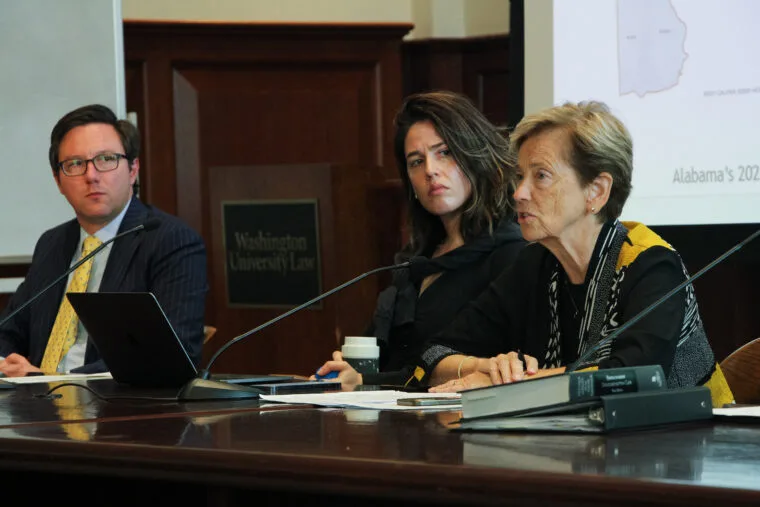
Washington University School of Law professors speak at the U.S. Supreme Court Review on September 26th. (Isabelle Diaz|Student Life)
Washington University School of Law held a Constitution Day Supreme Court (SCOTUS) panel and discussed cases related to LGBTQ+ discrimination, affirmative action, voting rights, and the Federal Student Loan forgiveness program, on Tuesday, Sept. 26.
Four WashU Law professors, Greg Magarian, Pauline Kim, Karen Tokraz, and Travis Crum, reviewed the cases and provided students with a better understanding of their implications on certain social issues, they also spoke about the Court’s recent deviation from certain precedents.
303 Creative LLC v. Elenis: Anti-Discrimination Laws and LGBTQ Rights
Professor Greg Magarian, constitutional law expert and former Supreme Court clerk, discussed the case 303 Creative LLC v. Elenis, in which SCOTUS ruled that businesses can refuse service to LGBTQ couples.
Magarian said that he believes the ruling has broader implications, extending beyond LGBTQ rights and potentially justifying discrimination based on race or religion.
“Under this ruling WashU could hypothetically refuse admissions to Christian students,” Magarian said.
Magarian also said that he believes the court’s inconsistency with previous rulings tarnishes their reputation.
“I’ve had crunch wraps more supreme than this court,” Magarian said.
Students for Fair Admissions v. Harvard: Affirmative Action
Professor Pauline Kim, former clerk for the 9th circuit court of appeals, discussed the Students for Fair Admissions v. Harvard case. The Supreme Court’s ruling banned affirmative action policies in higher education admissions.
Pauline also discussed Justice Sotomayor’s dissenting opinion which challenged the idea that the US is “colorblind” and argued in favor of race-based admissions policies for historically disadvantaged groups.
Pauline quoted Sonia Sotomayor and said, “although progress has been slow and imperfect, race-conscious college admissions policies have advanced the Constitution’s guarantee of equality.”
Biden v. Nebraska: Student Debt Relief
Professor of Law Karen Tokarz spoke about Biden v. Nebraska, the case against the constitutionality of Biden’s Student Debt Relief Plan. The one-time debt relief plan would have allowed the Secretary of Education to cancel $430 billion in federal loans.
The case raised the question of whether or not the executive branch had the authority to enact this program.
In August 2022, Biden unveiled the plan after the Secretary of Education determined that the Health and Economic Recovery Omnibus Emergency Solutions (HEROES) Act granted the Biden administration authority to execute a loan cancellation program.
Tokarz brought up the motive of Biden’s political campaign, contending that the Biden administration acted outside of their designated powers and used the HEROES Act unconstitutionally.
Allen v. Milligan: Voting Rights
Travis Crum discussed the Allen v. Milligan case, in which SCOTUS overturned Alabama’s congressional district map on the basis that it dilutes African Americans’ voting powers.
Crum said that, based on precedent set by Shaw v. Reno, race cannot serve as a predominant factor in redistricting. However, Alabama claimed that their map was racially neutral.
Crum said that racial gerrymandering remains a contentious topic in American politics.
“Louisiana is being sued right now under a very similar theory,” Crum said. “So it would not surprise me to see the Louisiana case or another similar case go to court in the next year or two.”
He also said that on the day of the panel, the SCOTUS denied Alabama’s follow-up congressional district plan, also on the basis that it violated racial neutrality.
After the event, Crum said in an interview with Student Life that he sees increasing partisanship on the SCOTUS.
“The appointment of three justices by Trump was definitely out of the norm in terms of the number of justices a one-term president would get, and I think the way the court is moving right now is largely attributable to that change,” Crum said.


